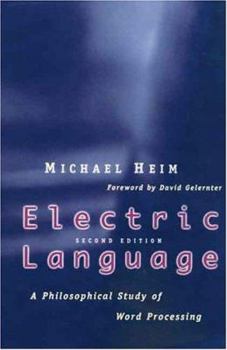Electric Language: A Philosophical Study of Word Processing; Second Edition
Select Format
Select Condition 
Book Overview
In this book Michael Heim provides the first consistent philosophical basis for critically evaluating the impact of word processing on our use of and ideas about language. This edition includes a new foreword by David Gelernter, a new preface by the author, and an updated bibliography. "Not only important but seminal, on the cutting-edge, furrowing new conceptual territory."-Walter J. Ong, S.J. "A philosopher ponders how the word processor has affected language use and our ideas about it. Heim shrewdly updates a school of thought, associated with such thinkers as Walter Ong, that maintains all changes in writing technology tend to change the way we perceive the world. His argument that word processing leads to fragmented thinking should be addressed and debated."-Carlin Romano, Philadelphia Inquirer "The arguments range over all of Western philosophy (and some Eastern as well), from the ancient Greeks to contemporary phenomenology. . . . Everyone who has used a word processor will find much to think about in Heim's ideas."-David Weinberger, Byte "Fascinating, clear, and well-done . . . stimulating and challenging."-Don Ihde, Philosophy and Rhetoric
Format:Paperback
Language:English
ISBN:0300077467
ISBN13:9780300077469
Release Date:March 1999
Publisher:Yale University Press
Length:320 Pages
Weight:0.96 lbs.
Dimensions:1.0" x 5.7" x 8.3"
Related Subjects
Business & Investing Business & Management Computer Science Computers Computers & Technology Education & Reference Engineering History History & Surveys Humanities Linguistics Manager's Guides to Computing Philosophy Politics & Social Sciences Science & Math Secretarial Aids & Training Skills Technology Textbooks Words, Language & GrammarCustomer Reviews
1 rating
A book of many fresh, interesting ideas.
Published by Thriftbooks.com User , 28 years ago
The introductory chapter of this intriguing and ground-breaking book sets forth the scope of the book with a clarity uncommon in reflective books of this genre. The author's opening comments state: "'Electric Language: A Philosophical Study of Word Processing' is an introductory study of the philosophical significance of the phenomenon of word processing." He then goes on to carefully explain that the book will constrain itself to this narrow topic. True to his word, he does not distract himself by discussing the details of any particular word processing program. Rather, his discussion and point of view deals with word processing as a general phenomenon. To be sure, Electric Language is a scholarly book, written principally for an academic audience. Yet the flashes of insight that sparkle on many pages of this book make it worth the effort of plowing through the passages on Plato, Aristotle, Heraclitus, and Heidegger. Of course, the ancients had little interesting of lasting value to say, and Heidegger's ideas can never be pinned down to an exact time and place, but it's good that someone at least gives these poor souls a respectful nod of the head. Articulating Thoughts Many of Us Might Have Passed Through Our Minds Already It's uncanny how the author of this book puts into words ideas that many of us have been thinking about already. Heim serves as a "perceptive fish, " taking time to examine closely the water we've all been swimming through unknowingly: "When we speak of word processing, we are speaking of a true phenomenon of our time, in the sense of something appearing with a certain historical uniqueness. But while such eventful things are phenomenal or striking in their appearance, the essential nature of such a phenomenon may not thrust itself upon us as easily as the recognition of it as an unprecedented appearance." If we don't take the time to think about these things today, tomorrow we'll be so attuned to the benefits of word processing that we won't even be able to remember the world before them. We have a narrow window of opportunity to think these thoughts. While the future rushes at us with increasing speed, the past, too, is receding from us at an equivalent speed. One of the concepts Heim examines is the idea that word processors facilitate the "external representation of thought." Those of us who can type quickly can "dump" our ideas onto a computer screen, and then play with the ideas on screen, rather than in our minds. Word processing beckons the tentative, preformed idea to emerge from the recesses of the mind. Embryonic notions, barely formed at all, feel bold enough to take up residence on your computer screen. Word processing, from a psychodynamic viewpoint, is an interesting study in " emboldening" technology. Likewise, the emergence of typography in the 15th century went one step further as an "emboldening" technology: "One of Ong's most striking studies concerns the connection between the as





